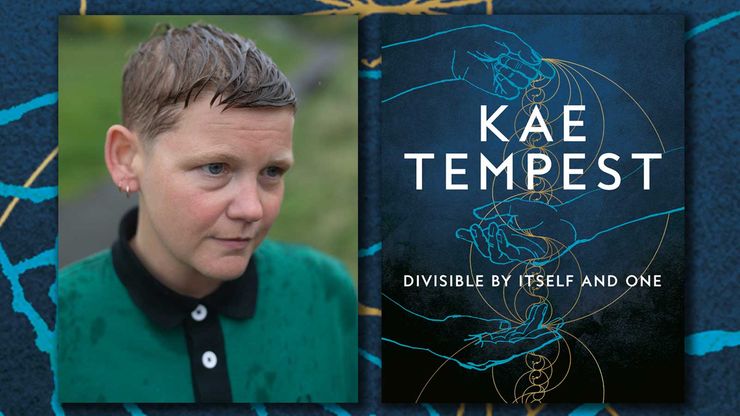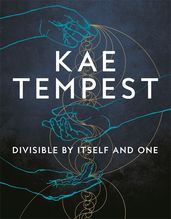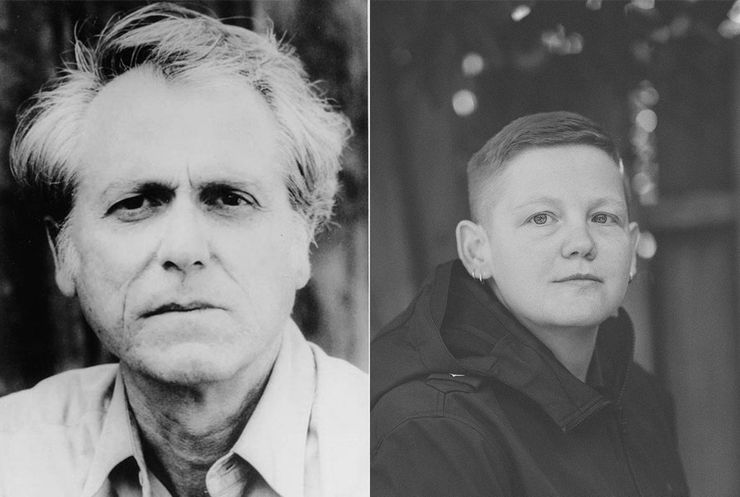'Through the artifice of putting words into those rhythms and into that metre, you create a different kind of truth': Kae Tempest on their new collection
Poet Kae Tempest talks to us about how they write, the musicality of language on the page, and the poignancy of prime numbers.

Kae Tempest is a poet, lyricist, performer and recording artist. Their work includes the Mercury Music Prize-nominated Let Them Eat Chaos and the Ted Hughes Award-winning narrative poem Brand New Ancients. Their new poetry collection, Divisible by Itself and One, is out now.
The title of Divisible by Itself and One comes from the definition of a prime number. How did the concept influence the poems?
I am interested in patterns and sequences, and I’m really taken by repetition. I find it endlessly recurring and repeating in my work: I’m always coming back to this idea of how to break cycles, or how to acknowledge and find peace with cycles. I’m not really invested in the maths of it, that particular description is just extremely poignant to me: ‘divisible by itself and one’. Quite often, when I hear a phrase that doesn’t belong to poetry, but belongs to something like maths, I find it so beautifully poetic. I’ve just been taken by that phrase for a long time.
Do poems arrive separately over a long period of time, or is there a dedicated period where you concentrate on writing a central idea?
The way it happens is that these poems start coming out, they begin to group themselves around certain themes, and then you realise: oh, I might have a collection on my hands, rather than just little poems that are occurring. And at that point in the process the title will appear, or you’ll find a title that feels right, and then you start to really know what the collection wants to be and where it goes.
[With this collection] the thing that drove me really to think oh, I’ve got something here that I want to stick with, was this idea of form. I work in musical form all the time: lyricism I learnt, through ear, through listening to other lyricists, storytellers, rappers, MCs. That’s how I learned about my base level rhythm, which is inside my body, and often when it comes to writing poetry, I am writing from the same place, rhythmically, as I would write lyrics. But I am learning as I mature as a poet, to look for the rhythm in a different place, to understand the musicality of language on the page as a different thing from the musicality of the language that you sing or speak.
As a performer, how does not having an audience in front of you when you’re recording affect you?
The experience of communicating directly with somebody will transform any text. Any words, the minute you’re actually speaking them to a person, everything changes. I can sit here and I can read these words, and I can imagine somebody at home listening, and it will change the dynamic of how I perform it. But actually if there were people in this room and I was reading it to them, there would be a kind of physiological response in me, in them. There would be some connection that gets made that informs everything: the dynamics, the flow, my nerves, their nerves. I haven’t thought of this experience [recording the audio version of the new collection] as being anything like the experience of giving a performance.
Do you see your poems as evolving things that are incomplete until you perform them? How does the idea of the physical voice translate to your writing?
In terms of the voice, the experience of the poems coming to life, what I can say is that they exist in different places. The poem is the poem. It comes from where it comes from, the same place music comes from I imagine; this other place. And you get the first scent of it, and you put it through all the rigorous discipline of what you’ve learned in your life as a poet, and then it lives on the page. It’s a book – luckily, beautifully, it’s published – and then it finds somebody. Where they’re at – I don’t know anything about who or what or when or why – in the moment that person finds it, reads it: that’s the moment when it has meaning and a vitality that creates connection.
How do you approach writing poetry?
So if I’m working on poems, I like to be at home. Home feels good for that. I don't necessarily mean in my house, I just mean stationed in one place. Rooted. I like to write in notebooks, with a pen. I enjoy the initial play of just pen and paper, and just following it, seeing where it goes.
In the collection you’ve got this combination of margin-to-margin outpourings, kind of one-breath, one-sentence splurges. . . I feel like those poems are more truthful in terms of trying to capture the experience of feeling. And then the more formal ones are interesting to me because through the artifice of putting words into those rhythms and into that metre, you create a different kind of truth.
I go back to this thing of solitude and being on your own with the poem. You have to create space to just be together, when there’s not a million things being asked of you. Once the poem’s finished, the poem’s got nothing to do with me. You put everything into it and you work on it and you work with it, but when it’s done it’s done. It’s not yours anymore. It was never yours in the first place. I don’t know where it fucking comes from! All I know is how hard I have to work to accommodate it when it comes. Where it comes from and where it’s going to go, you don’t have any say in that. If you begin the poem with its end in mind, you've already killed the poem. You’ve limited everything about what it could be or where it could go, or what its identity wants to be.
‘I’m going to sit down and write about this’? It’s not like that. You have to listen, and you have to follow, and at some point you start to lead. At some point you say to the poem, now you listen to me, and then off it goes.
Divisible by Itself and One
by Kae Tempest
The powerful new collection from our foremost truth-teller Kae Tempest. Ruminative, wise, with a newer, more contemplative and metaphysical note running through, this is a book engaged with the big questions and the emotional states in which we live and create. Some of the poems experiment with form, some are free, and yet all are politically and morally conscious. Divisible by Itself and One is also a book about human form, the body as boundary and how we are read by the world. Taking its bearings –and title – from the prime number, Divisible by Itself and One is concerned, ultimately, with integrity: how to live in honest relationship with oneself and others.



